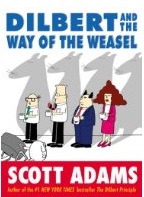 I’ve spent the last few minutes of the last few nights on my back laughing so hard tears trickled down to my ears. I’m highlighting my way through Dilbert and the Way of the Weasel by Scott Adams.
I’ve spent the last few minutes of the last few nights on my back laughing so hard tears trickled down to my ears. I’m highlighting my way through Dilbert and the Way of the Weasel by Scott Adams.
“You can ignore almost everything that is asked of you and in the long run it won’t matter. Either the tasks will become moot or your boss will forget what he asked you to do, or someone else will do it.” Or, “If you stall long enough, every corporate initiative ends, even layoffs.”
I particularly enjoyed the description an encounter with a salesman for a local radio station that was trying to convince Adams to buys advertising for the resturant he co-owns. Adams asked the sales person how many listeners the radio station had.
“The sales weasel explained, ‘You have to spend money to make money.’ I pointed out that he probably knew the number of listeners and that I could decide on my own if it was worth knowing. The weasel responded by explaining how many human beings lived within listening range of his station, i.e. weaselmath. I asked how that mattered if they weren’t actually listening, just potentially listening.”
“Then he explained that it’s much more expensive to advertise on other radio stations on a cost-per-relevlant-listener basis. I asked how he knew that if he didn’t know how many listeners he had.”
“He explained to me that some of my competitors were advertising on his station and they must be getting some benefit or they wouldn’t be doing it. I pointed out that most of my competitors weren’t advertising on his station and if not advertising wasn’t working, they wouldn’t be doing it. It wasn’t a good meeting.”
God help us if radio listening ever becomes as brutally measurable as the Web.



